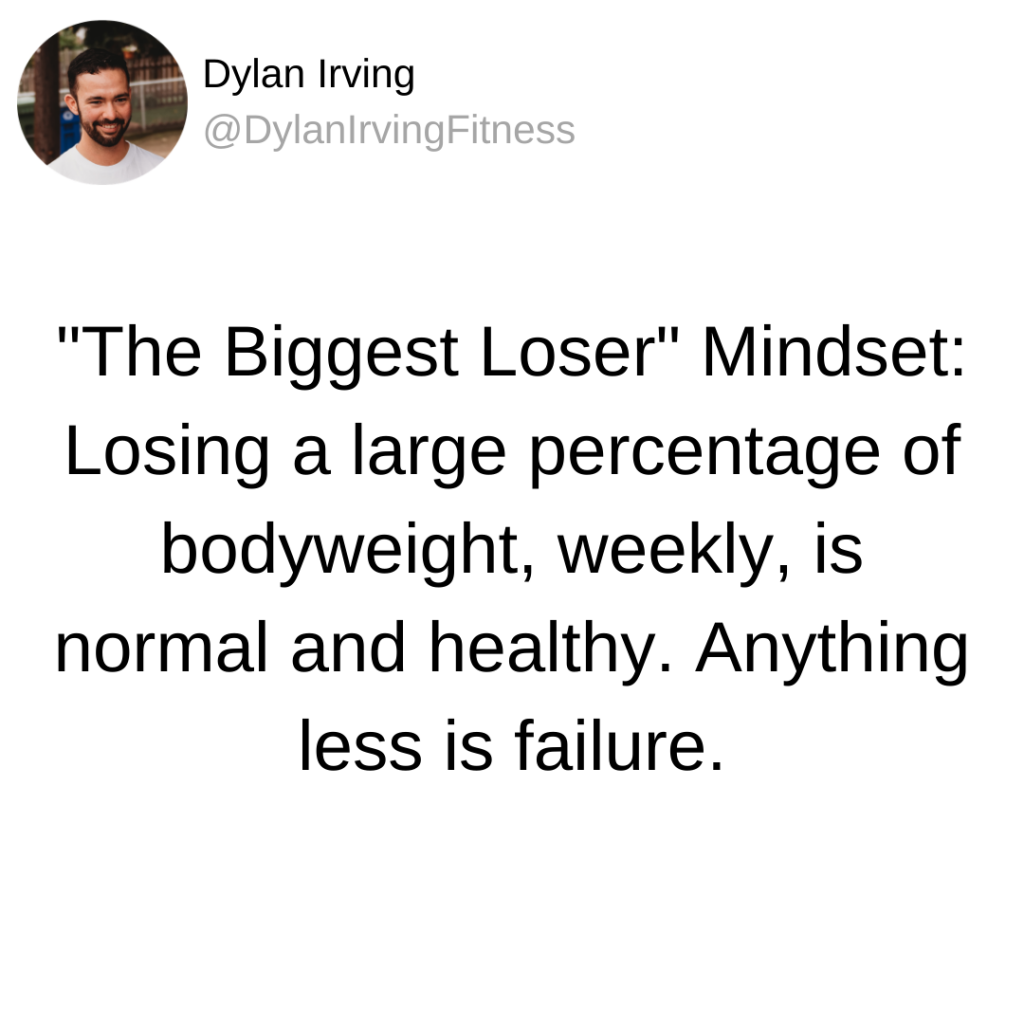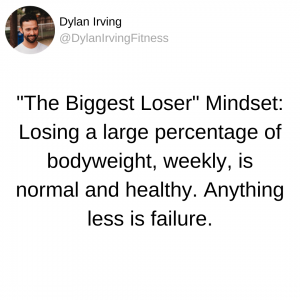*This post is about weight loss. If you’re not interested in losing weight now, or ever, that’s okay!*
Do you remember The Biggest Loser?
The first episode of The Biggest Loser aired on NBC in 2004. For 30 weeks (that’s about 7.5 months), contestants worked with personal trainers, doctors, and nutritionists to lose weight. Typically, the person who lost the least amount of weight in a given week was voted off the show. In the end, the person who lost the highest percentage of bodyweight won.
I think it spawned hope for many people. It inspired unofficial “Biggest Loser” competitions in offices and communities. It certainly brought awareness of fitness, nutrition, and weight-related disease risk to the masses. Its last season concluded in 2016. Over the life of the series, the average weight-loss per contestant in 30 weeks was over 100lbs. That’s more than 3.3lbs per week, or more than 13lbs per month, for 30 weeks straight.
In 2016, the National Institute of Health released a study that was focused on the contestants who participated in season 8 of the show (aired in 2009). It turned out that most contestants regained most of the weight they lost, some gained all of it back, and some gained back what they lost plus some.
Why?
The NIH showed that contestant’s drastic weight loss lead to significant metabolic and hormonal changes. At rest, they burned fewer calories by hundreds compared to other people of the same size. Also, a severe decrease in the hunger controlling hormone leptin left them feeling hungry continually. The more weight a contestant lost in the same 30-week timeframe, the worse their metabolism and hormones were affected.
Again: The more weight a contestant lost in the same 30-week timeframe, the worse their metabolism and hormones were affected. That means that a faster rate of weight loss led to even more unsatisfactory long-term results.
Research has shown, and anecdotal evidence agrees that a slower and more steady, habit and lifestyle-based approach to weight management is best. It’s more effective in terms of the outcome-goal of weight-loss and is more comfortable both mentally and physically.
What does this look like?
•A realistic, manageable, sustainable weight-loss per week is 0.25%-0.5% of one’s bodyweight. This assumes a thoughtful program that accounts for exercise, nutrition, lifestyle, and environment, and is customized to an individual. This also assumes periods where a person takes a purposeful “break” from said plan to recover and reduce overall fatigue.
•Making small changes over periods of time. If a change feels overwhelming, break it into smaller bits, and tackle it that way.
Don’t aim to be the biggest loser. Break out of that mindset. Progress is not failure, and progress can be defined in a million different ways.
It’s 2019.
I believe we’re slowly moving toward a place where we’re better educated on average about fitness, nutrition, and health. It was announced earlier this year that The Biggest Loser will be rebooted in 2020. I’m interested to see if the methods used will be updated, and I sure do hope NBC is more responsible this time around. In the meantime, remember that the fitness and nutrition industry feeds on our need for fast results with limited effort, and remember that long term health and happiness aren’t found on that path.
–
Have any questions? Email me at dylanirvingfitness@gmail.com. I’d love to chat!
–
Ready to meet your goals? Click here to schedule your free consultation.
–
Want more great content? Click here to sign up for the newsletter.







